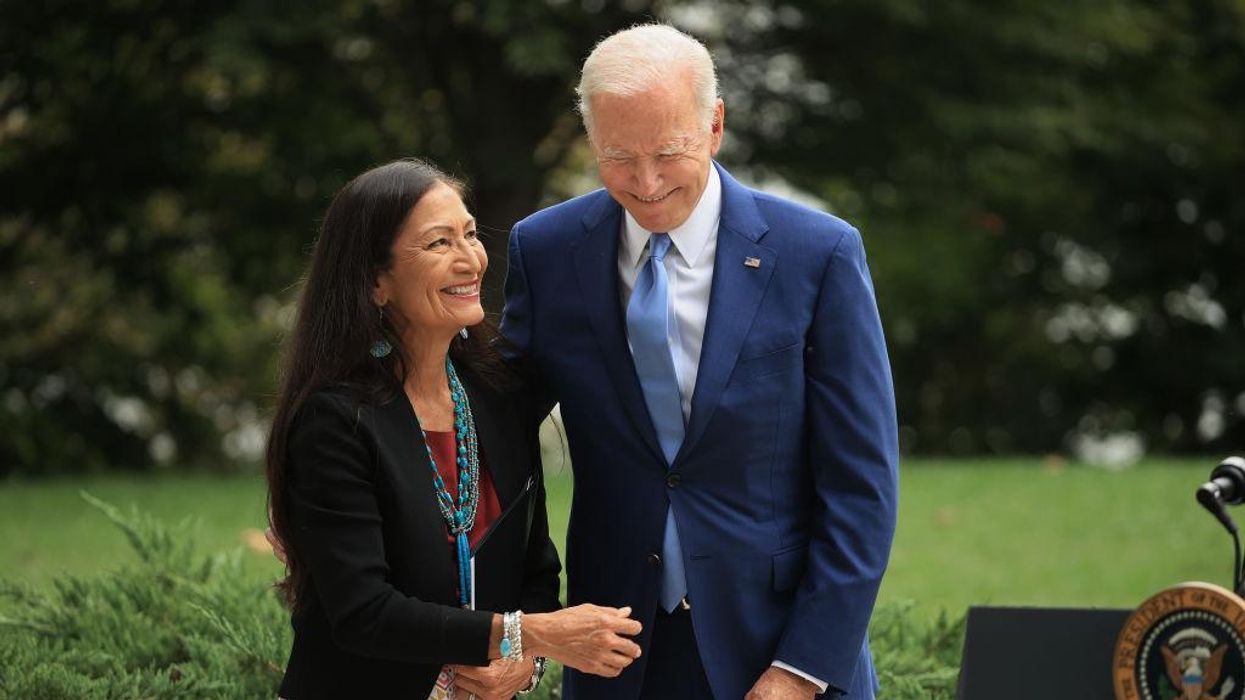
Photo by Chip Somodevilla/Getty Images

On Thursday, the Biden administration announced that it had completed the task it set for itself last year: changing the names of hundreds of places on federal land that included the word "squaw," which is regarded by many to be a derogatory term. 650 names have been changed, although more names perceived to be derogatory for this and other reasons may soon be changed as well.
A list of the changes has been made available by the United States Geological Survey.
Some of the changes are simple English substitutions. For instance, Squaw Dance Valley in Navajo County, Arizona, was changed to Cliff Rose Valley and Little Squaw Brook in Hamilton County, New York, is now Onion Brook. Other changes swapped out perceived derogatory titles for names in native languages. For example, Squaw Gulch in Alaska became Jëjezhuu Tr'injàa Gulch.
In November 2021, Secretary of the Interior Deb Haaland declared by secretarial order "squaw" to be a derogatory term, and ordered the Board on Geographic Names to begin to remove the term from federal usage.
She stated "Racist terms have no place in our vernacular or on our federal lands. Our nation's lands and waters should be places to celebrate the outdoors ... not to perpetuate the legacies of oppression."
Haaland, the first native American to serve as a Cabinet secretary, likened the Algonquin word for woman to the N-word, identified as derogatory by Secretary Stewart Udall in 1962.
According to the Canadian government's Terminology Guide: Research on Aboriginal Heritage, squaw is a "phonetic rendering of an Alognkian word meaning the totality of being female." The guide noted that while the term has been misused, unencumbered by contextual baggage it merely and deferentially denotes a woman or womanhood. It appears in traditional use "in other related words like nidobaskwa (a female friend), manigebeskwa (a woman of the words), or Squaw Sachem (a female chief).
In a letter from Ives Goddard published in News from Indian Country, the linguist noted that in "its historical origin ... the word squaw is perfectly innocent." He noted many "languages of the Algonquian family have related words for 'woman' that can be reconstructed back to the Proto-Algonquian parent language as *ethkweewa by using the techniques of comparative linguistics."
Goddard provided evidence of the term's originally believed innocuity and interchangeability: "Massachusett squa appears in the Massachusett Bible (printed in Cambridge, Massachusetts, in 1663) in Mark 10:6, translating 'female'."
Goddard recognized, however, that the term in the public consciousness had become "generally considered disparaging."
There have been efforts to "reclaim" the word, such as those made by Dr. Margaret Bruchac, associate professor of anthropology at the University of Pennsylvania. Bruchac argued in a paper entitled "Reclaiming the Word 'Squaw' in the Name of the Ancestors" that "Banning the word will not erase the past, and will only give the oppressors power to define our language."
Bruchac pointed out that the word's misuse shouldn't justify the word's elimination, because such an approach would mean that any native word could be transmogrified by bad actors and then made forbidden. "What words will be next? Papoose? Sachem? Pow Wow? ... To ban indigenous words discriminates against Native people and their language."
Haaland and others in the Biden administration think the prudent action to take would be to ban the native word, noting that this particular word has "historically been used as an offensive, ethnic, racial and sexist slur."
The U.S. Department of the Interior said that its revisionist task force received over 1,000 recommendations for name changes and will continue to consider new proposals for name changes.
Per Haaland's Secretary's Order 3405, the Biden administration will continue to replace names, besides those employing the morpheme of the Algonquin word for woman.
On November 19, 2021, Haaland announced the creation of a new federal advisory committee to be comprised of a set amount of members from select racial and identity groups. This committee will recommend to the secretary names they think are derogatory and fit for changing.
Not all changes prompted by racial sensitivities and activism have been state-led in recent years.
Despite its original name paying "tribute to a great people," the Washington Redskins were rendered virtually nameless until January 2022, when the team became the Washington Commanders.
In 2021, the Cleveland Indians became the Cleveland Guardians.
Quaker Oats' renamed its "Aunt Jemima" pancake mixes and syrups last year. They are now branded "Peal Milling company." The black woman previously depicted on the products has been replaced with a watermill.
Before the Department of the Interior got to work, Land O'Lakes removed the native woman depicted on its butter products since 1928.